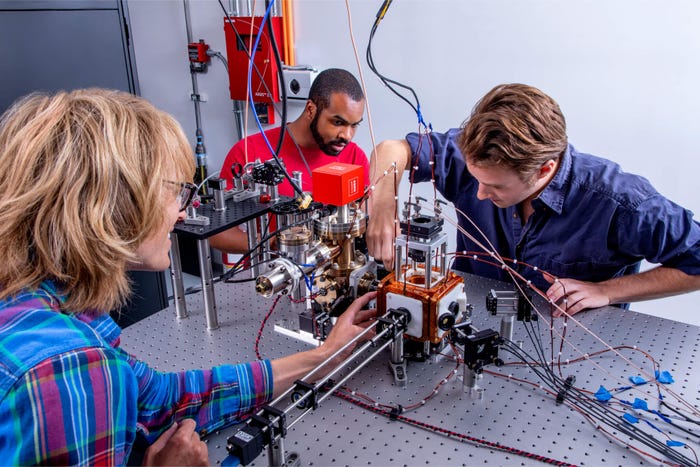
Connects decision-makers and solutions creators to what's next in quantum computing
Quantum Technologies Transform Health Care: ReportQuantum Technologies Transform Health Care: Report
Quantum computing, sensing and secure communications target impact health care delivery challenges

Quantum technologies are already playing a transformative role in life sciences and health care and could potentially address further challenges in these sectors, according to a new report.
The Quantum for Life report, published by the United Kingdom’s non-governmental innovation agency Innovate U.K., describes advancements in quantum computing, sensing, communications and data security.
Quantum Sensing
Quantum sensors are used in medical diagnostics to detect biological signals with exceptional accuracy, offering the potential for early disease detection and continuous monitoring of patients.
They could also help with the identification of breast cancer, detect traces of various cancers in blood, enhance glucose monitoring and X-ray imaging and improve epilepsy monitoring.
Quantum Computing in Drug Discovery
Quantum computing's ability to process vast datasets could speed drug discovery processes by simulating molecular interactions more efficiently than classical computing, potentially reducing the time and cost of bringing new drugs to market.
In genomics, quantum computers could handle large-scale genetic datasets more effectively, helping uncover genetic markers for diseases and improving the accuracy of personalized medicine.
Secure Data Transmission
Quantum communication methods, particularly quantum encryption, offer a new level of security for the transmission of sensitive medical data. As health care becomes increasingly digital, protecting patient information from cyber threats is paramount.
Quantum key distribution ensures encryption keys are secure and cannot be intercepted without detection, providing an additional layer of privacy for medical records and other personal health information. This secure communication infrastructure is crucial for the future of telemedicine, where patient data needs to be transmitted safely across networks.
Collaboration and Regulation
The report also underscores the importance of cross-sector collaboration between health care providers, quantum tech companies and academic institutions to drive innovation and ensure these technologies are effectively integrated into health care systems.
It also discusses regulatory frameworks and ethical considerations, emphasizing the need for a balanced approach to ensure both the safety and efficiency of quantum applications in life sciences.
“This is an exciting time for quantum. 2024 marks ten years since the launch of the U.K. National Quantum Technologies Program and next year is the UNESCO International Year of Quantum Science and Technology,” said Innovate U.K. Business Connect head of emerging and connected technologies Matthew Wasley.
“Since 2018, Innovate U.K. has invested over $18 million in quantum projects specifically for health care and life science applications and the result has been incredible. There are now countless projects that could drastically impact health care delivery, from those in initial R&D to those already in early commercialization.”
The full report is available here.
About the Author
You May Also Like






